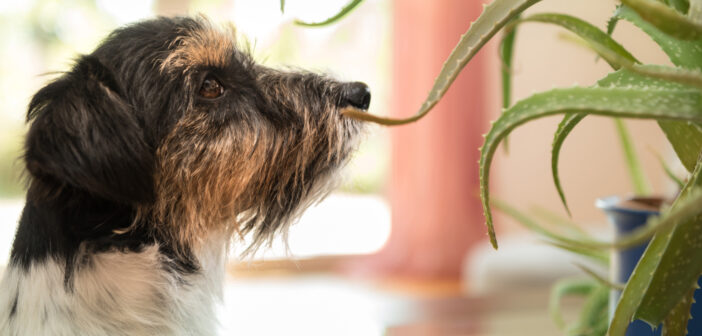Spring is the time for flowers and plants. As soon as April begins, many of us flock to our local garden shops and nurseries, looking for a little bit of potted beauty to spice up our indoor and outdoor environments. This is all fine and fun; but if you have pets hanging around, you may want to be a little more discerning about the plants you choose to showcase. Some can be harmful if ingested by our four-legged friends, causing sickness and even death.
These 12 common plants are poisonous to pets:
1. Aloe Vera
A very common household plant, aloe vera is something your dog needs to avoid. Ingesting any part of the plant can cause vomiting, diarrhea, tremors and central nervous system depression.
2. Autumn Crocus
Of the two crocus varieties (spring and autumn), the autumn crocus is more dangerous. While the spring crocus can cause vomiting and diarrhea; the autumn crocus will cause gastrointestinal bleeding, liver and kidney damage, and respiratory failure in both dogs and cats. If your animal ingests either of the two crocus varieties, a trip to the vet should be made in short order.
3. Azalea & Rhododendron
Chosen for their colorful punch, azaleas and rhododendrons are a common addition to flower gardens and can have a negative effect on pets. Ingesting just a few leaves causes vomiting, diarrhea and drooling. If the animal does not receive immediate medical help they could fall into a coma and possibly die.
4. Baby’s Breath
Another common addition to bouquets and floral arrangements, baby’s breath, if ingested by dogs, will cause severe bouts of vomiting and diarrhea. Avoid introducing it into your home, if possible.
5. Begonia
Another dog irritant, the begonia may not be as dangerous as some of the others on this list. Still, we don’t want our doggo to experience mouth swelling and inflammation, drooling or vomiting. Be careful keeping them at ground level and if you have your begonias in a hanging basket, make sure that it is high enough that the dog won’t get to it.
6. Daffodil
Our springtime friend is extremely harmful to our pets if ingested. Eating any part of the plant will produce vomiting, diarrhea, abdominal pain, cardiac arrhythmias or respiratory depression. Crystals located in the bulb of the plant will additionally cause severe tissue irritation and excessive drooling.
7. Holly
This common Christmas adornment should be kept far away from Fido. Ingestion of the plant will cause persistent vomiting and diarrhea.
8. Ivy
Ingesting ivy of just about any type is harmful to both cats and dogs. Your pet will experience intense abdominal pain, vomiting, diarrhea and excessive drooling and you should make a trip to your veterinarian for monitoring.
9. Lily
Another flower that is extremely common for indoor and outdoor decoration, the many different varieties of lilies have varying toxicities for cats. The most dangerous and potentially fatal are true lilies that include tiger, day, Asiatic, Easter and Japanese Show. Even the smallest amount ingested will cause severe kidney failure. If you believe that your cat has eaten any part of a lily, rush her to the emergency veterinarian.
10. Lily of the Valley
Another well-loved plant, it can cause vomiting, diarrhea, severe cardiac arrhythmias and seizures if ingested by your pet. If you have a curious, furry friend running around, think twice about adding the flower to your garden
11. Tomato
It’s in everyone’s garden and it can harm man’s best friend. While the fruit of the tomato plant is fine (and tasty), eating the leaves and stems can cause a dog weakness, drowsiness, dilated pupils, confusion, slow heart rate and abdominal distress. Stay away from the garden while playing fetch.
12. Tulip & Hyacinth
If your puppy is digging around the tulips or hyacinths, you will need to break them of the habit. The bulbs of both plants are extremely poisonous to dogs. Ingestion will cause gastrointestinal irritation, drooling, loss of appetite, a breakdown of the central nervous system, cardiac abnormalities, convulsions and death. There is no specific antidote for the poison, but a veterinarian can help an animal through the symptoms.








